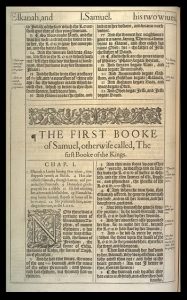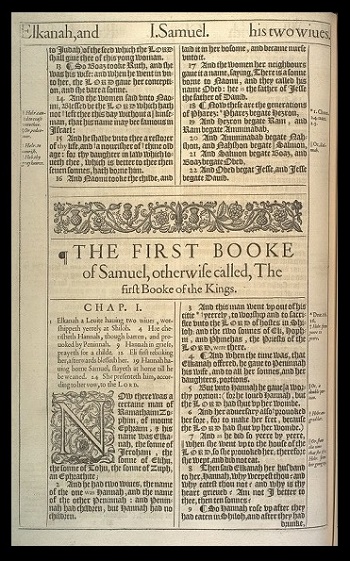 I have been reading the four-hundredth anniversary facsimile edition of the King James Bible, 1611, published by Oxford University Press. The original King James Bible included the Apocrypha, the Order of Psalms and Lessons to be said at Morning and Evening Prayers, diagrams, and other portions that have been removed from later printings. The 1611 title page reads, The Holy Bible, Conteynung the Old Testament, and the New. Newly Translated out of the Originall tongues & with the former Translations diligently compared and reuised by his Maiesties speciall Comandment Appointed to be read in Churches. Imprinted at London by Robert Barker, Printer to the Kings most Excellent Maiestie. Anno Dom. 1611, which shows that the King James Bible was the official English version sanctioned by the monarch. However, the English edition of the era for Protestants was the Geneva Bible published in 1560 in Switzerland. If one was a thorough-going Protestant at the time of the debut of the King James Bible, then one would have been reading the Geneva Bible. King James held some hope that his Bible would satisfy both the Protestants of the Church of England and the Puritans, but things did not go as planned. In the end, though, King James won because many today would know of his Bible, but it is likely that few would know that English Protestants used the Geneva Bible.
I have been reading the four-hundredth anniversary facsimile edition of the King James Bible, 1611, published by Oxford University Press. The original King James Bible included the Apocrypha, the Order of Psalms and Lessons to be said at Morning and Evening Prayers, diagrams, and other portions that have been removed from later printings. The 1611 title page reads, The Holy Bible, Conteynung the Old Testament, and the New. Newly Translated out of the Originall tongues & with the former Translations diligently compared and reuised by his Maiesties speciall Comandment Appointed to be read in Churches. Imprinted at London by Robert Barker, Printer to the Kings most Excellent Maiestie. Anno Dom. 1611, which shows that the King James Bible was the official English version sanctioned by the monarch. However, the English edition of the era for Protestants was the Geneva Bible published in 1560 in Switzerland. If one was a thorough-going Protestant at the time of the debut of the King James Bible, then one would have been reading the Geneva Bible. King James held some hope that his Bible would satisfy both the Protestants of the Church of England and the Puritans, but things did not go as planned. In the end, though, King James won because many today would know of his Bible, but it is likely that few would know that English Protestants used the Geneva Bible.
Much of the Old Testament book titled in the King James Version, “The First Booke of Samuel, otherwise called, The first Booke of the Kings,” recounts Israel’s decision to have a king and be ruled like all the other nations of the day. God had been covenantally faithful to his people. He had brought them out of bondage in Egypt. He had increased the population of the twelve tribes of Israel to number as the sands of the sea and the stars of heaven. He had led his people through the wilderness feeding them with manna while enduring patiently their repeated complaints. Then, God gave Israel the land he had promised. God ruled Israel and was their Covenant King. He had repeatedly been faithful to his unfaithful people. But God’s faithfulness was not good enough for the Hebrews, nor was the Lord’s theocratic rule considered sufficient by his nation.
Neverthelesse, the people refused to obey the voyce of Samuel; and they said, Nay, but we will haue a King over vs: That we also may be like all the nations, and that our King may iudge vs, and goe out before vs, and fight our battels. (I Samuel 8:19-20)
The people complained to the Lord much like children do when they want to participate in some activity, go somewhere, or have some new possession. Israel wanted to be like all the nations; children want to be like all their peers.
So, what did the Lord do? He warned them regarding the tyranny of a king’s rule. A king would tax the people, make war, and generally use his power relentlessly. But the people still wanted a king. So, the Lord selected Saul of the tribe of Benjamin who outwardly looked the part because of his impressive stature. Samuel anointed Saul, so Israel was at last like the other nations. Saul was then given a new heart by the Lord for the task ahead (10:9). For a time things went well, but then King Saul abused his power, over stepped the limits of his office as king, and disobeyed God in other ways. Saul was told by God that he would no longer be the king, which left him awaiting a successor of unknown identity.
When Samuel was sent by the Lord to the house of Jesse to anoint the next king, he was impressed by Eliab’s appearance and thought he would make a fine ruler of Israel. The Lord told Samuel it was not Eliab. God included in his instructions to Samuel an important principle to remember while Jesse presented his sons as potential candidates for the throne.
But the Lord said vnto Samuel, Looke not on his countenance, or on the height of his stature, because I haue refused him: for the Lord seeth not as man seeth; For man looketh on the outward appearance, but the Lord looketh on the heart. (I Samuel 16:7)
 The reason why this post on Presbyterians of the Past is using the King James Bible is because First Samuel 16:7 was a memory verse of mine several years ago and the version I learned was the King James (but with modernized spelling). It is a verse that has persevered in my memory and repeatedly reminded me that the Lord looketh on the heart. It does not matter whether one is a king, commoner, or peasant, the Lord looketh on the heart. Included in the margin of the King James Bible are Scripture references associated with the word heart in the verse, one of which is particularly relevant to David. In First Chronicles 28, David was giving instructions to Solomon regarding how he should rule Israel when he ascends to the throne. David told him to live in God’s favor, fear him, and build the temple. Central to the passage is verse 9.
The reason why this post on Presbyterians of the Past is using the King James Bible is because First Samuel 16:7 was a memory verse of mine several years ago and the version I learned was the King James (but with modernized spelling). It is a verse that has persevered in my memory and repeatedly reminded me that the Lord looketh on the heart. It does not matter whether one is a king, commoner, or peasant, the Lord looketh on the heart. Included in the margin of the King James Bible are Scripture references associated with the word heart in the verse, one of which is particularly relevant to David. In First Chronicles 28, David was giving instructions to Solomon regarding how he should rule Israel when he ascends to the throne. David told him to live in God’s favor, fear him, and build the temple. Central to the passage is verse 9.
And thou, Solomon, my sonne, know thou the God of thy father, and serue him with a perfite heart, and with a willing minde: for the Lord searcheth all hearts, and vunderstandeth all the imaginations of the thoughts: if thou seeke him, he will be found of thee, but if thou forsake him, he will cast thee off for euer.
Common to all three kings—Saul, David, and Solomon, was the importance of the heart. In the case of Saul, the Lord gave a new heart to him when he was anointed king; in the case of David, he was selected because the Lord looketh on the heart; and then David told Solomon he should pursue purity of motivation because the Lord searcheth all hearts.
God’s emphasis on the heart with respect to these three kings of Israel is a reminder. One might purpose to do something with righteous intentions, but then the results do not work out very well or the intentions are misinterpreted. On the other hand, one might take an action that appears righteous, but the action was in fact driven by inappropriate motives. Jesus reminded his followers that the Pharisees looked good, they appeared righteous, but they were motivated by self righteousness. So, whether you read the Bible passages mentioned in this post in the King James Version or another, it would be good to remember that one’s motivation for following Christ should be driven from a pure heart and Christians should believe the best about the motives of others in the family of God .
BARRY WAUGH
If you would like to see the book of First Samuel in the original King James Bible, then this link will take you to a copy on Internet Archive. The images for this post are from Internet Archive.
Note that spelling in the original King James Bible with its confusion of u, v, i, y, and j is partiallhy attributable to the use of the letters in Latin. The nearly fifty academics who translated the King James Bible from the original texts would have read, wrote, and even spoken Latin. Another aspect of the spelling is that French had been the court language of English royalty until the fifteenth century or so, which means that English was in transition not only from Latin influences but also French. Another aspect of the spelling is that the use of English was not standardized and words were often inconsistently spelled. Finally, there was the practical problem with printing books in the era. Printers often did not have a large enough number of copies of each character in their fonts to set a page of text for printing, so letters were substituted phonetically. For example, if a word ended in “y” but all the copies of that letter had been used for setting the page of text, then “ie” might have been substituted. In the KJV 1611, I read one verse in which the same word was spelled three different ways.





